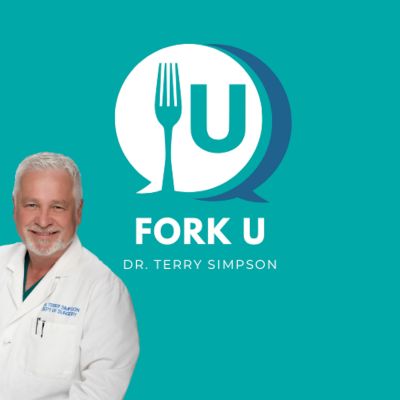Fork U(niversity) Not everything you put in your mouth is good for you. There’s a lot of medical information thrown around out there. How are you to know what information you can trust, and what’s just plain old quackery? You can’t rely on your own “google fu”. You can’t count on quality medical advice from Facebook. You need a doctor in your corner. On each episode of Your Doctor’s Orders, Dr. Terry Simpson will cut through the clutter and noise that always seems to follow the latest medical news. He has the unique perspective of a surgeon who has spent years doing molecular virology research and as a skeptic with academic credentials. He’ll help you develop the critical thinking skills so you can recognize evidence-based medicine, busting myths along the way. The most common medical myths are often disguised as seemingly harmless “food as medicine”. By offering their own brand of medicine via foods, These hucksters are trying to practice medicine without a license. And though they’ll claim “nutrition is not taught in medical schools”, it turns out that’s a myth too. In fact, there’s an entire medical subspecialty called Culinary Medicine, and Dr...
https://www.forku.com
episode 30: Whole Grains Reduce Obesity
Whole Grains Reduce Obesity While the low-carb world and its extremists will tell you that grains are evil, they are wrong. There is a significant difference between refined and whole grains. Whole grains contain the bran, a fiber-rich outer sheath. Further whole gains have the germ cell and the endosperm. But the refined grain is just the endosperm. Compare whole grain bread, which contains substantially more fiber and vitamins than the white bread. Consuming refined grains increases the risk of heart disease. But consuming whole grains decreases risks of heart disease, diabetes, and cancer. Bran is rich in fiber. Additionally, bran is a source of B vitamins, iron, copper, zinc, magnesium, and phytochemicals. Fiber is an “essential nutrient.” An essential nutrient is defined as a nutrient your body cannot make and must get from your diet. But carnivore aficionados disagree; they believe fiber is not an essential nutrient. Carnivores note that you really don’t digest fiber. And they opine that people can live without fiber. However, they forget one key, the microbiome. The microbiome are the trillions of bacteria, yeast, and fungi that live in your gut. Many scientists consider the gut microbiota another “organ” of our body. There is a clear difference in the type and number of bacteria that occupy the guts of people with obesity compared to those who are not obese. Some bacteria will increase hunger hormones. Those same bacteria also decrease satiety hormones, need more food to feel "full." Finally, they increase the ability of fat cells to increase in size, leading to obesity. In the microbiome, what feeds the bacteria that decrease obesity includes the fiber from whole grains. The bran of whole grains contains powerful fibers like oligosaccharides.
What is a serving of whole grains? It seems confusing, especially since some products are a mix of both whole and refined grains. In the Mediterranean Diet, you might notice 9 ounces, but is that grain when it is dry or wet or both?
So it turns out there is a whole grain council that has done the work for you, and they tell you right on the package.
This makes your math simple. You either need three stickers of the 100% whole grain or six of the other stickers.
